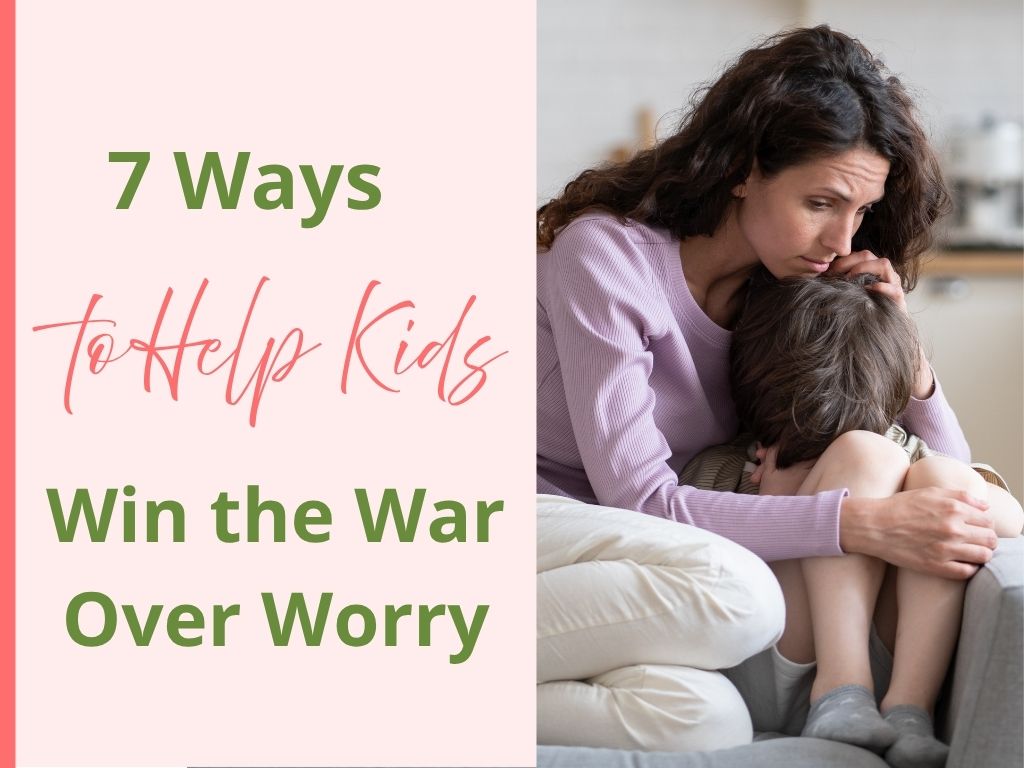Have you ever felt helpless trying to help a child overcome their fear and anxiety?
Whether it’s fearful resistance to something new or unfamiliar, or a full on meltdown, dealing with a child caught in emotional distress is a difficult situation. Not only is it disruptive, but it’s also heartbreaking to see them going through such a hard time. How can you help them get control of themselves so everyone can function?
We’re all caught in unfamiliar territory due to the current ‘new normal’ of the pandemic and everyone is feeling the pressure of anxious thoughts of the present and future. Kids, who are like little emotional magnets are sensitive to the atmosphere around them and have their own issues to deal with going back to school with a whole bunch of new rules.
Also, during this pandemic, while we’ve all had to stay in our family bubble, many children have had much more time with their parents than usual. Some of them may not have handled that bubble bursting so abruptly as they leave the comfort of home to join their classmates! Everything’s different at school and there may be more stresses and pressures than usual which can create anxiety.
Those increased anxious feelings could potentially erupt into some uncharacteristic behaviors like crying, not cooperating, fits of anger or aggression, or even physical health issues like trouble sleeping, upset tummies, headaches or just feeling ‘yucky’.
What can we do to help the children we care about deal with these overwhelming feelings so they can get on with the business of learning and growing into the healthy and happy people we want them to be?
Let’s look at 7 ways we can help kids win the war over worry and anxiety:
1. Have a little more understanding and patience with them (and yourself!)
2. Show them how to become less afraid of fear and other emotions
3. Help them avoid avoiding uncomfortable situations
4. Teach them where feelings come from and how they can manage them
5. Praise and encourage efforts to make emotionally healthy choices
6. Give them more attention and connection when you are together
7. Create a haven of habit and safety for them at home
1. Have a little more understanding and patience with them (and yourself!)
We can all get frustrated easier when our stress levels are high. Our brains have all been bombarded with more angst than normal with the daily news focusing on so many serious issues lately. My husband and I, who normally get along well, have been a little more snippy with each other than usual, but we are quick to apologize and acknowledge the stresses we’re under and give each other some extra grace.
We need our children to cooperate so we can get things done and when they aren’t going with the program, we can fall into negative habits like yelling, threatening, bribing, or whatever works to get them to ‘smarten up’. After all, we’re the parent and they should just listen to us and obey, right?
Don’t forget that they are little and their feelings feel much bigger and more intense to them. They haven’t learned to handle them yet. Most of us adults still have a problem managing our emotions! If they are acting up more than usual, take a breath, and try to talk to them about what they’re feeling. They might just need a hug and affirmation that you love them and some assurance from you that they’re going to be okay.
I love the famous chapter on love from 1 Corinthians Chapter 13 that begins, “Love is patient, love is kind…” I often have to analyze my behaviour when I’m impatient and ask myself, “Was I loving? Was I patient and kind with my attitude, words, tone of voice and expression?” Too often I have to say “Ouch! No, I wasn’t!” If your stress is high, you might need to take some time out yourself and find a way to decompress in a healthy way.
2. Show them how to become less afraid of fear and other emotions
How can we help kids become less afraid of fear? First of all, by letting them know it’s normal and that everyone feels fear sometimes – even big strong people and heroes! Talk about emotions with them and even share about times you’ve been scared and how you did something anyway and it turned out okay. Talk about what bravery is – feeling fear but still taking action – even if it’s a small step. Try pointing out when characters in books of movies do something brave that they are afraid of.
3. Help them avoid avoiding uncomfortable situations
There are many things we don’t like to do and find ourselves procrastinating because it makes us uncomfortable. When it comes to something we fear, the tendency to avoid it becomes even stronger. It’s really good to practice taking baby steps to overcome our fear. (See my article on How to Overcome Your Fears One Step at a Time)
When it comes to our kids, we can sometimes be overprotective. We wish they didn’t have to go through hard things in life. Unfortunately, this isn’t a reality, so the best thing we can do is to help them learn to deal with difficult situations. If we keep solving things for our kids, or finding a way for them to avoid unpleasant things they don’t want to experience, they’ll never learn how to deal with them on their own. It will also become a pattern for them to avoid solving problems instead of facing them, which only leads to bigger issues down the road.
I read a good article on the website for Weill Cornell Medicine, titled, Raising Emotionally Healthy Children, During the Pandemic and Beyond. It encourages us that the only way to learn coping skills and resilience is to practice, and shared this quote by Dr. Shannon Bennett, director of psychology of the Division of Child and Adolescent Psychiatry and clinical director for the Youth Anxiety Center –
“If we never experienced hardship or stress, we will never learn how to cope with hardship and stress. This is an unfortunate reality of life. We need family support and teacher support and network support, but not overprotection. Youth need to experience anxiety and stress to learn how to manage it effectively throughout their lives. And this looks different at different stages of development. Our gut instinct as a parent is to protect and to keep our youth safe and to try to clear away any hardship that may stand in their way—which is really, really well-intentioned—but can sometimes lead to accommodation or facilitation of anxiety and avoidance. We want to find this appropriate balance between support and accommodation, which is hard.”
When your child’s dealing with fear, see if you can get them to take small steps that will build their confidence.
4. Teach them where feelings come from and how they can manage them
Most of us don’t stop and think about where our feelings come from, but brain science shows that thoughts (even subconscious ones) create feelings, which lead to actions. We can change our feelings by choosing more helpful thoughts. My son and I created a book together called I’m the Thinker of My Thoughts, that portrays this in an easy way that kids can understand. It shows thoughts as friends or bullies and how the thoughts we let hang around will affect how we feel, what we do, and who we become. It can help empower your child by learning they get to choose which thoughts can stay and which ones have to ‘Go Away!’
5. Praise and encourage efforts to make emotionally healthy choices
As busy, often stressed-out parents, we can easily fall into the trap of only correcting our kids when they do things wrong, or only praising results, and not efforts. Make a habit of praising your child for specific efforts they’ve made to practice emotional self-control, or overcoming fears by being willing to try new things. Also, when they talk to you about their feelings, take time to listen and don’t correct them and say they shouldn’t feel that way. Affirm them that their feelings are genuine and important and thank them for sharing. Then try to find a way together that can help them manage their emotions in a more constructive way.
6. Give them more attention and connection when you are together
When we’re feeling vulnerable and emotional, we all need a little extra tender loving care. It doesn’t always take a long time to reassure your child with affection. Even if you’re busy, you can:
• Give them a big hug and just hold them for a moment
• Look them in the eyes and tell them you love them
• Build them up with your words of appropriate encouragement or praise that let’s them know you believe in them
• Give them more signs of affection like a smile or pat on the back
• Take a moment to ask them about their feelings and really listen (Check out this article on How to Open the Door to Deeper Conversations with Your Kids)
Bonus: These also work great to create more connection with your spouse!
7. Create a haven of habit and safety for them at home
Kids thrive on routine. Many of our routines of life are out of whack at the moment, but if you can give them the security of some regular routines at home, it can really help ease the stress on them. Also, be careful of the conversations you have around them that can add to their fear. Sometimes as we discuss the news or our opinions with other adults in the home, or on the phone, we forget that the kids are listening even if they seem busy playing.
Practice making the home a positive place and give them some fuel for good thoughts. Find positive books, watch shows with a good message and talk about things from a positive perspective. If you can all practice finding things to be grateful for every day, it also really helps reduce stress and focuses your mind on better things.
I hope you found something here to help you and your family transition well into this new season of school and that you will continue to foster these anxiety busting practices for a lifetime!
Thanks for reading,
Noella


